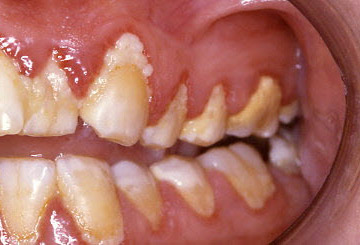Aetiology
The cause of gingivitis is dental plaque that accumulates daily on teeth.[23] No specific single bacterium causes gingivitis, but gram-negative periodontopathogens, such as Tannerella forsythia, Treponema denticola,Campylobacter species, and Selenomonas species, have been associated with its early stages.[23][24][25][26][27]
NG is caused by infectious agents, although predisposing factors are critical in facilitating bacterial pathogenesis. The most relevant predisposing factors are those altering host immune response, including psychological stress, insufficient sleep, poor diet, tobacco and alcohol consumption, and recent systemic diseases. Poor oral hygiene and previous history of NG are also shown to be predisposing factors. No specific microbiota has been associated to NG, but Prevotella intermedia, Treponemaspecies, Selenomonasspecies, and Fusobacteriumspecies are frequently detected.[18]
Pathophysiology
Bacterial products and toxins cause an inflammatory response in the gingiva within 4 to 8 days of dental plaque accumulation. It is primarily composed of T lymphocytes and macrophages and, as such, plaque-induced gingivitis follows a similar pattern to a controlled delayed-type hypersensitivity response.[28][29]
Classification
Plaque-induced gingivitis
Caused by dental plaque (dental biofilm) that forms on the teeth daily. It may be acute or chronic and is not associated with loss of support for the teeth.[Figure caption and citation for the preceding image starts]: Plaque-induced gingivitisCollection of Giuseppina Campisi, DDS, MS and Giuseppe Pizzo, DDS [Citation ends].
Necrotising gingivitis (NG)
An infection of the gingiva that may be associated with increased personal stress, heavy smoking, poor nutrition, HIV/AIDS, and some other diseases where the immune system is compromised. NG is an atypical, acute form of gingivitis that is uncommon in developed countries but is more common in developing countries as a consequence of severe malnutrition. NG may occur in people who share living conditions, but it is not transmissible from one person to another.[Figure caption and citation for the preceding image starts]: Necrotising gingivitisCollection of Giuseppina Campisi, DDS, MS and Giuseppe Pizzo, DDS [Citation ends].
Use of this content is subject to our disclaimer